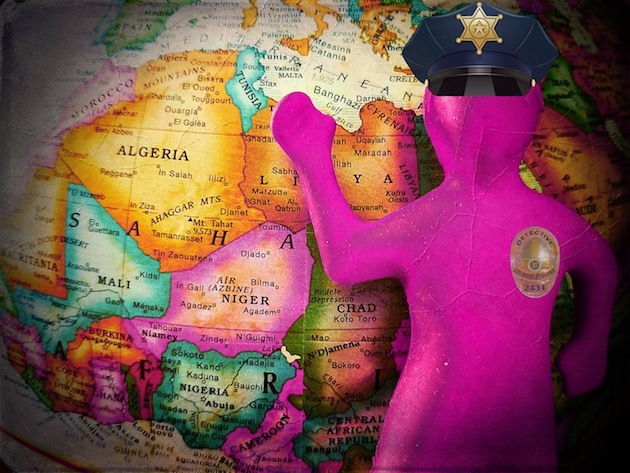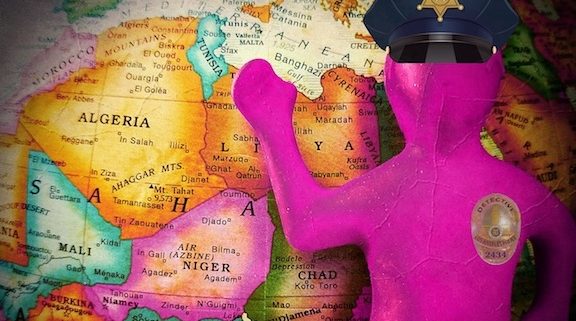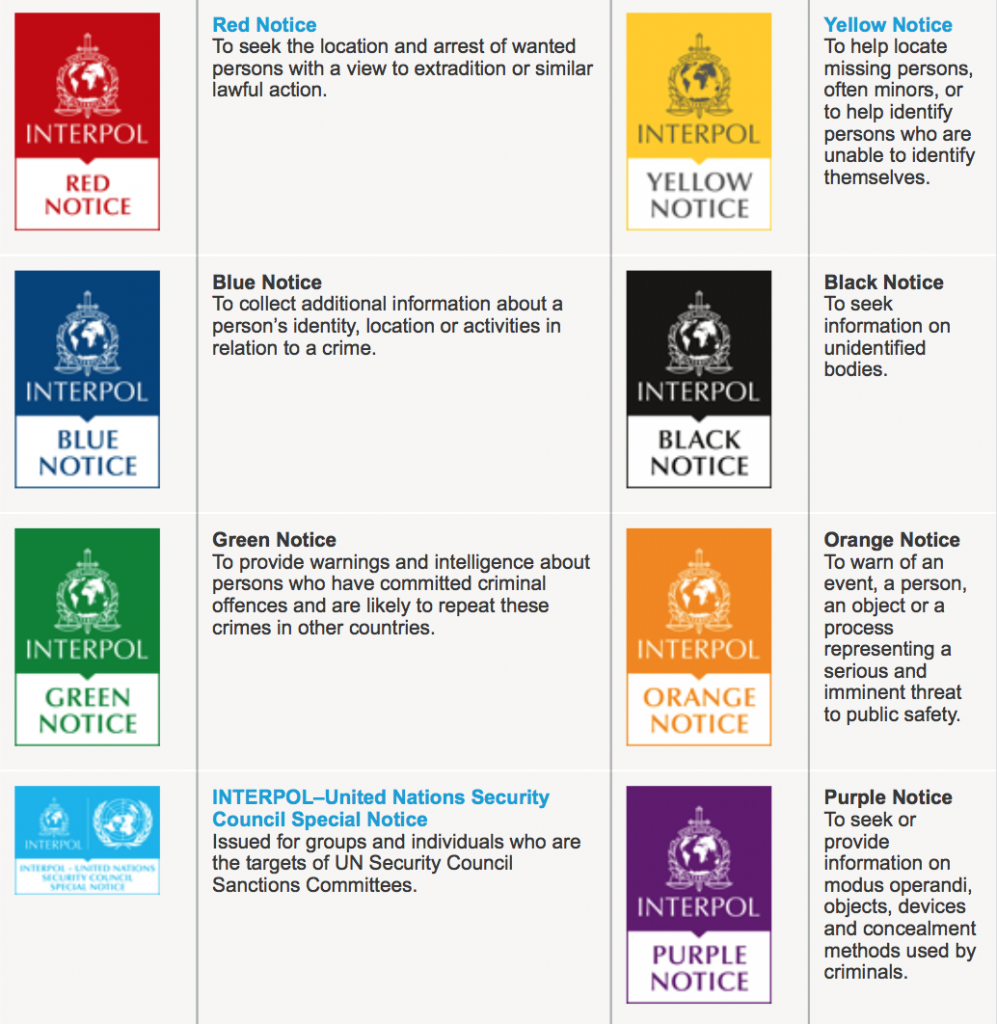Twenty-five years ago, I spent a considerable amount of time in meeting rooms for what seemed like forever, listening to instructors droning on and on with mind-numbing facts and figures and information about INTERPOL (International Criminal Police Organization), its structure, day-to-day activities. I and my fellow investigators were also schooled on the inner workings of the INTERPOL-U.S. National Central Bureau (USNCB).
I’m certain many things/policies have changed over the past quarter-century, but the premise is the same. INTERPOL’s original mission was to:
- “Insure and promote the widest possible mutual assistance between all criminal police authorities within the limits of the laws existing in the different countries and in the spirit of the ‘Universal Declaration of Human Rights.’
- To establish and develop all institutions likely to contribute effectively to prevention and suppression of ordinary law crimes.”
Today, Interpol’s Mission and Vision have evolved with a changing world.
Vision and mission
The vision – what INTERPOL aspires to achieve.
“Connecting police for a safer world”
Our vision is that of a world where each and every law enforcement professional will be able through INTERPOL to securely communicate, share and access vital police information whenever and wherever needed, ensuring the safety of the world’s citizens. We constantly provide and promote innovative and cutting‐edge solutions to global challenges in policing and security.
The mission – what INTERPOL does to achieve its vision
“Preventing and fighting crime through enhanced cooperation and innovation on police and security matters”
We facilitate the widest possible mutual assistance between all criminal law enforcement authorities. We ensure that police services can communicate securely with each other around the world. We enable global access to police data and information. We provide operational support on specific priority crime areas. We foster continuous improvement in the capacity of police to prevent and fight crime and the development of knowledge and skills necessary for effective international policing. We strive for innovation at all times, in the areas of police and security matters.
 In the beginning, Interpol was not designed to be a working police force, with agents running around the globe arresting super-villains. In fact, Interpol agents and employees don’t have arrest powers. Instead, their basic purpose was, and still is, to provide the means to connect police officers in member countries (not all countries are members of INTERPOL) so that international investigations flow as smoothly as possible. In short, according to INTERPOL, they “share expertise, technology, and resources.”
In the beginning, Interpol was not designed to be a working police force, with agents running around the globe arresting super-villains. In fact, Interpol agents and employees don’t have arrest powers. Instead, their basic purpose was, and still is, to provide the means to connect police officers in member countries (not all countries are members of INTERPOL) so that international investigations flow as smoothly as possible. In short, according to INTERPOL, they “share expertise, technology, and resources.”
A group was established early-on to assist with seizing financial records and funds. Other groups consisted of an Organized Crime Group, an Opiates and Cannabis Group, Cocaine and Psychotropics Group, Counterfeit Currency Group, to name a few.
Based on information from member countries, INTERPOL issues color-coded advisory notices. The Red Notice requests the arrest of a suspect. It’s also an indicator that extradition of the suspect is desired. Red Notices include detailed information about the suspect, his/her charges, convictions, prior arrests, etc.
Blue Notices are designed to collect information of subjects—verification of identity, details about past criminal activity, location of the criminal, etc.
Yellow Notices are issued to provide information about missing persons, or for people who, for whatever reason(s), are unable to identify themselves. (I know, the text is brown but yellow didn’t stand out).
Black Notices are for unidentified bodies.
Green Notices provide police with information about people who’ve committed crimes and may be in a certain country.
Purple Notice – identifies a criminal’s methods of operation. This allows investigators in member countries to compare and track suspects.
Gray Notices supply updated information about international criminal activity.
In 1992, INTERPOL introduced a searchable database. Its purpose was to provide a central location for information regarding worldwide criminal activity. In 1998, INTERPOL’s Criminal Information System (ICIS) database was created.
Today, there are 192 member countries who enjoy the benefits of belonging to INTERPOL. The list includes Afghanistan, China, Russia, France, Germany, India, Israel, Japan, Republic of Korea, Spain, Saudi Arabia, and the U.S., to name only a few. FYI – At the time I spent in this certification program there were 176 member countries.
The goals of INTERPOL through the year 2020 are:
Strategic goals
1: Serve as the worldwide information hub for law enforcement cooperation
2: Deliver state-of-the-art policing capabilities that support member countries to fight and prevent transnational crimes
3: Lead globally innovative approaches to policing
4: Maximize INTERPOL’s role within the Global Security Architecture
5: Consolidate resources and governance structures for enhanced operational performance
So, please keep in mind when writing your tales of global criminal activity, that it is not the agents from INTERPOL who’ll be beating the streets to investigate crimes and arresting bad guys. That’s the job of the police. INTERPOL’s job is collect information and provide it to proper authorities. They also offer training for law enforcement. To sum up is easy. INTERPOL does this – ensures that law enforcement around the world has easy access to the tools they need to do their jobs effectively. Again, they provide training, expert investigative support, relevant data, and secure communications channels.
INTERPOL Does This …
- INTERPOL provides training
- analyzes information and investigative support
- conducts operations
- maintains and provides data and secure communications channels
In addition to the above, INTERPOL aids with:
Disaster – an emergency response to devastating events, such as natural disasters;
Crime – the deployment of specialized personnel to assist and support a member country faced with a major or serious police issue. They can and do provide specific expertise and investigative support to police.
Fun Facts:
- The U.S. began its participation in INTERPOL in 1938. However, when World War II began, the U.S. temporarily suspended membership until 1947. The FBI withdrew its participation in 1950. Until their exit, the FBI had control of our involvement with INTERPOL. The Treasury Department then assumed that control.
- INTERPOL manages a database of fingerprints containing more than 181,000 fingerprint records and almost 11,000 latent fingerprints (as of December 2017).
And there’s …
- The Face Recognition System database.
- Stolen and Lost Travel Documents (SLTD) database contains records on lost, stolen and revoked travel documents
- Stolen Administrative Documents (SAD) database containing information such as vehicle registration documents and clearance certificates for import/export.
- Counterfeit documents – The Digital INTERPOL Alert Library (Document Dial-Doc) is a joint G8-INTERPOL initiative, which allows countries to share global level alerts.
- Comparison of genuine and fake documents database contains images, descriptions and security features of genuine travel and identity documents issued by countries and international organizations.
- Stolen Property database contains records of stolen motor vehicles, vehicle parts, vessels and works of art are likely to be trafficked across borders.
- The Works of Art database contains descriptions and pictures of cultural objects reported as stolen by member countries and international partners such as the International Council of Museums and UNESCO. The database also includes items stolen in Afghanistan, Iraq and Syria.
- The Firearms Program helps member countries collect and analyze more effectively the information found both on the inside and outside of firearms
- The INTERPOL illicit Arms Records and tracing Management System (iARMS) supports transnational tracing through tracking and record keeping of illicit firearms, including those that are lost and/or stolen.
- The INTERPOL Ballistic Information Network is the only large-scale international ballistics data sharing network in the world that provides intelligence to law enforcement agencies by way of centralized storage and cross-comparison of ballistics imaging.
- Organized Crime Network – helps to improve the exchange of intelligence and to support investigations
- The maritime piracy database stores intelligence related to cases of piracy and armed robbery at sea
- The Project Geiger database is used to collect, sort, and analyze information on trafficking and other illegal or unauthorized activities involving radiological and nuclear materials.
Remember …
- INTERPOL does not employ law enforcement officers.
- INTERPOL uses four official languages to communicate with member countries—English, French, Spanish and Arabic.
- INTERPOL does NOT contact private citizens. Any contact will be made via local law enforcement. If you are contacted by someone who says they’re an INTERPOL officer, well, that statement would be false. Call your local police to let them know.




